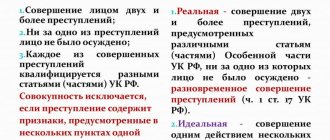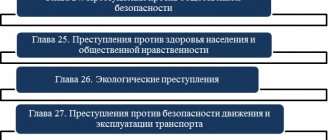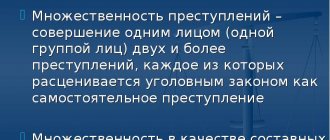Concealment of especially serious crimes not promised in advance -
shall be punishable by a fine in the amount of up to two hundred thousand rubles, or in the amount of the wages or other income of the convicted person for a period of up to eighteen months, or by forced labor for a term of up to two years, or by arrest for a term of up to six months, or by imprisonment for a term of up to two years.
Note. A person is not subject to criminal liability for concealment of a crime committed by his spouse or close relative who was not promised in advance.
- Article 315. Failure to comply with a court sentence, court decision or other judicial act
- Article 317. Encroachment on the life of a law enforcement officer
The essence of concealment as a criminal offense
In criminal law, there are two types of concealment of crimes:
- Not promised in advance, when information about a crime became known to the defendant after it had been committed (Article 316 of the Criminal Code of the Russian Federation) and only after that he helped the criminal.
- By prior conspiracy, when the concealment of a criminal, instruments of a crime, or other information important for the investigation is agreed upon in advance. Such actions are considered by the court as complicity and entail more severe punishment for the perpetrator.
Concealing a crime involves the following actions:
note
Responsibility for storing firearms, traumatic and bladed weapons is provided for in Art. 222 of the Criminal Code of the Russian Federation and Federal Law on Weapons No. 150. So, depending on the circumstances of the crime, the punishment can be up to 8 years in prison + a fine. Read more in a separate article
- Providing shelter to the attacker, assistance in forging documents, changing his appearance, providing him with transport and assistance to travel outside the region, country, etc.
- Hiding, destroying, changing the appearance of weapons or other items that were used during illegal actions.
- Destruction of traces of a crime, such as fingerprints, washing away traces of blood, etc.
- Concealment of items that were obtained by criminal means. If items are hidden, for the possession of which there is a criminal article (drugs, radioactive substances, etc.), then the act is qualified under the relevant article.
The action can be either single or in combination.
Liability under Article 316 of the Criminal Code of the Russian Federation is possible only for physical concealment; intellectual concealment cannot be included in the crime. Intellectual concealment often includes giving deliberately untruthful testimony or an expert opinion, but such an act falls under Art. 307 of the Criminal Code of the Russian Federation.
The object of the crime is the administration of justice.
Important! The assistance provided to the criminal must be significant. As a rule, it does not allow the crime to be solved without delay. If the assistance was insignificant and could not influence the investigative actions, then there will be no charges of concealment and criminal liability. In cases where a citizen only had information about a crime, but did not help commit it, he may be held liable under Art. 205.6 - failure to report a crime.
The subject can be any legally capable individual who is at least sixteen years old. The subjective side is characterized by direct intent. This means that a person who did not intentionally help a criminal escape or hide the weapon and objects of a crime cannot be charged with concealment.
The motives for a crime can be very different: material gain, personal attitude, hidden threat, etc. This or that motive does not exempt from responsibility for concealment, but can be taken into account when passing a sentence.
Responsibility for concealing a crime begins from the moment when the accused committed actions aimed at helping the criminal, even if the goal of such actions was not achieved, or was partially achieved.
Judicial practice under Article 316 of the Criminal Code of the Russian Federation
Resolution of the Presidium of the Supreme Court of the Russian Federation dated September 13, 2017 N 137-P17
under Art. 316 of the Criminal Code of the Russian Federation for 1 year 6 months; according to paragraph “c” of Part 4 of Art. 162 of the Criminal Code of the Russian Federation for 11 years; according to paragraphs “g”, “h”, part 2 of Art. 105 of the Criminal Code of the Russian Federation for 14 years;
Appeal ruling of the Judicial Collegium for Criminal Cases of the Supreme Court of the Russian Federation dated October 4, 2017 N 72-APU17-21
- September 14, 2011 by the Khiloksky District Court of the Trans-Baikal Territory under Art. 316 of the Criminal Code of the Russian Federation using Part 2 of Art. of the Criminal Code of the Russian Federation to 10 months 18 days of imprisonment with serving the sentence in a maximum security correctional colony, convicted of:
Appeal ruling of the Judicial Collegium for Criminal Cases of the Supreme Court of the Russian Federation dated May 30, 2018 N 25-APU18-2SP
Requirements of Part 2 of Art. 338 of the Code of Criminal Procedure of the Russian Federation, contrary to the arguments of the complaints, was not violated by the court. Factual circumstances, according to which the actions of Khadzhaev A.M. may be qualified under Art. 316 of the Criminal Code of the Russian Federation, were not examined at the court hearing and contradicted the position of the defense, occupied by it during the entire judicial investigation and debates of the parties, and therefore could not be included in the question list. Thus, the arguments of the complaints about the refusal to raise the question of the existence of factual circumstances entailing the responsibility of the convicted person for a less serious crime are untenable.
Appeal ruling of the Judicial Collegium for Criminal Cases of the Supreme Court of the Russian Federation dated June 20, 2018 N 81-APU18-8
Convict Mikheev A.S. and his defender - lawyer Kupriyanova O.A. indicate that the court’s conclusions do not correspond to the factually established circumstances of the case, and the punishment imposed on Mikheev is regarded as excessively harsh. They declare the non-involvement of A.S. Mikheev. to commit the murder of the victim, about the absence of Mikheev A.S. motive and desire to cause the death of Ch. about the unreliability of A.S. Mikheev’s testimony. during the preliminary investigation, due to his being intoxicated. They are asking to reclassify the actions of A.S. Mikheev. at the station 316 of the Criminal Code of the Russian Federation and reduce the punishment assigned to him. In addition, the lawyer’s complaint contains a request to change the verdict in relation to the decision made on the civil claim of the victim and to reduce the amount to be recovered from A.S. Mikheev.
Appeal ruling of the Judicial Collegium for Criminal Cases of the Supreme Court of the Russian Federation dated August 30, 2018 N 66-APU18-16
Criminal prosecution of K. under Art. 316 of the Criminal Code of the Russian Federation was terminated due to the expiration of the statute of limitations. Contrary to the arguments of the complaints, K.’s testimony is consistent and consistent. The court did not establish any grounds for the slander. The Judicial Collegium does not see any such either. At the same time, K.’s testimony is objectively confirmed by other evidence:
Determination of the Judicial Collegium for Criminal Cases of the Supreme Court of the Russian Federation dated November 8, 2018 N 72-UD18-13
Also convicted in the case: Erokhin K.S. according to clause “g”, part 2, art. 105 of the Criminal Code of the Russian Federation and Madanyu M.S. according to Art. 316 of the Criminal Code of the Russian Federation. By the appeal ruling of the judicial panel for criminal cases of the Supreme Court of the Russian Federation dated August 26, 2014, this sentence was left unchanged and entered into legal force.
Appeal ruling of the Judicial Collegium for Criminal Cases of the Supreme Court of the Russian Federation dated November 28, 2018 N 5-APU18-84
convicted under Art. 316 of the Criminal Code of the Russian Federation to a fine of 100,000 rubles. Taking into account the time of detention in the period from June 22, 2021 to June 5, 2021, the court released her from serving the specified sentence. It was decided to recover compensation for moral damages from M.A. Gorsky in favor of each of the civil plaintiffs M. and S. 1,000,000 rubles, from Sultanova I.V. 200,000 rubles.
Appeal ruling of the Judicial Collegium for Criminal Cases of the Supreme Court of the Russian Federation dated February 20, 2019 N 89-APU19-1
- according to Art. 316 of the Criminal Code of the Russian Federation to 1 year of imprisonment. Based on Part 3 of Art. The Criminal Code of the Russian Federation for the totality of crimes by partial addition of punishments imposed 7 years of imprisonment to be served in a high-security correctional colony.
Appeal ruling of the Judicial Collegium for Criminal Cases of the Supreme Court of the Russian Federation dated February 26, 2019 N 69-APU19-4
In this criminal case under Art. 316 of the Criminal Code of the Russian Federation, Vostretsov Alexander Vladimirovich was convicted with release from punishment due to the expiration of the statute of limitations for criminal prosecution, the verdict against which was not appealed. It was decided to recover from the convicted Potapov A.A., Novosadov A.F. in favor of G. for compensation for moral damage of 300,000 rubles each.
Appeal ruling of the Judicial Collegium for Criminal Cases of the Supreme Court of the Russian Federation dated March 26, 2019 N 45-APU19-4
The evidence examined by the court testifies only to Ibragimov D.’s awareness of the preparation and commission of a crime against the victim, that is, the presence in his actions of signs of a crime under Art. 316 of the Criminal Code of the Russian Federation - concealment of crimes. He asks to change the sentence against Jeyhun Ibragimov: to qualify his actions in the episode of January 17, 2021 under Art. 316 of the Criminal Code of the Russian Federation, according to which to terminate criminal prosecution on the basis of clause 3 of part 1 of Art. 24 of the Code of Criminal Procedure of the Russian Federation for the expiration of the statute of limitations for criminal prosecution and to refuse the claims of the victim B.
Determination of the Constitutional Court of the Russian Federation dated April 25, 2019 N 903-O
The Constitutional Court of the Russian Federation, by Ruling No. 2166-O dated September 28, 2021, refused to accept V.V.’s complaint for consideration. Gerasimovich for violation of his constitutional rights by part five of article and article 316 of the Criminal Code of the Russian Federation, since it did not meet the requirements of the Federal Constitutional Law “On the Constitutional Court of the Russian Federation”, according to which a complaint to the Constitutional Court of the Russian Federation is considered admissible: in particular, from the moment completion of the consideration of V.V.’s case Gerasimovich in court and before he filed a complaint with the Constitutional Court of the Russian Federation, more than a year passed.
Commentary to Art. 316 Criminal Code
1. The objective side is expressed in the form of actions for the concealment of especially serious crimes not promised in advance, which manifests itself in concealing the fact of such a crime, objects, traces, the person who committed the crime, destruction of the instruments of the crime, etc. Unlike complicity in the form of aiding and abetting, acts of concealment are promised in time and committed after the commission of the crime.
2. Concealment of a particularly serious crime by giving knowingly false testimony or refusal to testify is qualified under Art. 307, 308 of the Criminal Code, respectively.
3. The note stipulates that a person is not subject to criminal liability for concealment of a crime committed by his spouse or close relative that was not promised in advance, which corresponds to the provision of Part 1 of Article 51 of the Constitution of the Russian Federation.
A corpse in the carpet under the noses of the police and other stories
Full statistics from the Judicial Department at the Supreme Court for 2016 are not yet available, but it is already known that in the first six months of 2016, courts handed down 108 sentences under Article 316. 15 people received real sentences (14 of them - less than one year), 13 - suspended imprisonment, 44 people - fines, two people - another suspended sentence. 27 people were released from punishment under an amnesty, and seven more on other grounds.
In September 2021, the Leninsky District Court of Omsk ordered 25-year-old Ruslan Leshko and 21-year-old Vladislav Veshnyakov to pay a fine of 10 thousand rubles each. On the night of February 25, 2021, the young people received a call from their 20-year-old friend, who asked them to urgently come to his home. On the spot, it turned out that the owner of the house, along with two other friends, beat his mother’s partner to death. Veshnyakov and Leshko agreed to help bury the body in a grove not far from the house and carried it out of the entrance in a carpet. But there were policemen standing on the corner, and upon noticing them, the young people threw the body right next to the house and ran away. The police did not pay attention to the carpet: the deceased was found a day later by passers-by. Three accused of his murder received nine years in a maximum security colony.
Among those still awaiting trial is Kristina Chistyakova, an accomplice of those accused of attacking the family of the head of the Department of Internal Affairs of the city of Otradny, Samara Region. Her acquaintances beat policeman Dmitry Vashurkin and killed his wife, after which they robbed their house and fled. Chistyakova is accused of helping to hide stolen money, bank cards and other valuables.
In the Kaluga region, they continue to investigate the murder of a four-year-old girl in a foster family: the woman who adopted her beat the child to death with a mop. The husband of the accused murderer was charged with Article 316 because he helped take the girl’s body to the forest and bury it there. In total, there were three children in the family: the couple’s own 11-year-old son and the 16-year-old brother of the deceased girl are now in a boarding school.
In Irkutsk, the investigation into the murder of a prostitute has been completed: her 23-year-old colleague strangled her out of jealousy. The boyfriend, who cheated on one sex worker with another, helped get rid of the corpse after the murder: he dismembered it and buried it, and his girlfriend fled to Kamchatka. Six months later, the police found the murder suspect and arrested her; the accomplice, accused under Article 316, is under recognizance not to leave the place.







